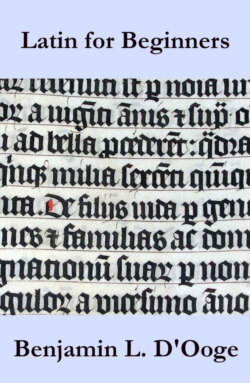Читать книгу Latin for Beginners - BENJAMIN L. D’OOGE - Страница 68
На сайте Литреса книга снята с продажи.
LESSON XIX THE FOUR REGULAR CONJUGATIONS PRESENT ACTIVE INDICATIVE OF AMŌ AND MONEŌ
Оглавление«126.» There are four conjugations of the regular verbs. These conjugations are distinguished from each other by the final vowel of the present conjugation-stem.[1] This vowel is called the distinguishing vowel, and is best seen in the present infinitive.
[Footnote 1: The stem is the body of a word to which the terminations are attached. It is often identical with the base (cf. §58). If, however, the stem ends in a vowel, the latter does not appear in the base, but is variously combined with the inflectional terminations. This point is further explained in §230.]
Below is given the present infinitive of a verb of each conjugation, the present stem, and the distinguishing vowel.
DISTINGUISHING
CONJUGATION PRES. INFIN. PRES. STEM VOWEL
I. «amā´re», to love «amā-» «ā» II. «monē´re», to advise «monē-» «ē» III. «re´gĕre», to rule «regĕ-» «ĕ» IV. «audī´re», to hear «audi-» «ī»
a. Note that the present stem of each conjugation is found by dropping «-re», the ending of the present infinitive.
NOTE. The present infinitive of «sum» is «esse», and «es-» is the present stem.
«127.» From the present stem are formed the present, imperfect, and future tenses.
«128.» The inflection of the Present Active Indicative of the first and of the second conjugation is as follows:
«a´mō, amā´re» (love) «mo´neō, monē´re» (advise) PRES. STEM «amā-» PRES. STEM «monē-»
SINGULAR PLURAL PERSONAL ENDINGS 1. a´mō, I love mo´neō, I advise -ō 2. a´mās, you love mo´nēs, you advise -s 3. a´mat, he (she, it) loves mo´net, he (she, it) advises -t
1. amā´mus, we love monē´mus, we advise -mus 2. amā´tis, you love monē´tis, you advise -tis 3. a´mant, they love mo´nent, they advise -nt
1. The present tense is inflected by adding the personal endings to the present stem, and its first person uses «-o» and not «-m». The form «amō» is for «amā-ō», the two vowels «ā-ō» contracting to «ō». In «moneō» there is no contraction. Nearly all regular verbs ending in «-eo» belong to the second conjugation.
2. Note that the long final vowel of the stem is shortened before another vowel («monē-ō» = «mo´nĕō»), and before final «-t» («amăt», «monĕt») and «-nt» («amănt», «monĕnt»). Compare §12.2.
«129.» Like «amō» and «moneō» inflect the present active indicative of the following verbs[2]:
[Footnote 2: The only new verbs in this list are the five of the
second conjugation which are starred. Learn their meanings.]
INDICATIVE PRESENT INFINITIVE PRESENT
a´rō, I plow arā´re, to plow cū´rō, I care for cūrā´re, to care for *dē´leō, I destroy dēlē´re, to destroy dēsī´derō, I long for dēsīderā´re, to long for dō,[3] I give da´re, to give *ha´beō, I have habē´re, to have ha´bitō, I live, I dwell habitā´re, to live, to dwell *iu´beō, I order iubē´re, to order labō´rō, I labor labōrā´re, to labor lau´dō, I praise laudā´re, to praise mātū´rō, I hasten mātūrā´re, to hasten *mo´veō, I move movē´re, to move nār´rō, I tell nārrā´re, to tell ne´cō, I kill necā´re, to kill nūn´tiō, I announce nūntiā´re, to announce pa´rō, I prepare parā´re, to prepare por´tō, I carry portā´re, to carry pro´perō, I hasten properā´re, to hasten pug´nō, I fight pugnā´re, to fight *vi´deō, I see vidē´re, to see vo´cō, I call vocā´re, to call
[Footnote 3: Observe that in «dō, dăre», the «a» is short, and that the present stem is «dă-» and not «dā-». The only forms of «dō» that have a long are «dās» (pres. indic.), «dā» (pres. imv.), and «dāns» (pres. part.).]
«130.» «The Translation of the Present.» In English there are three ways of expressing present action. We may say, for example, I live, I am living, or I do live. In Latin the one expression «habitō» covers all three of these expressions.
